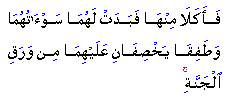Hayaa, Troublesome Matters, Islamic Economy
Issue 523 » April 3, 2009 - Rabi Al-Thani 7, 1430
Living The Quran
Ta-Ha (Ta-Ha)
Chapter 20: Verse 121 (Partial)
 Natural and Acquired Hayaa
Natural and Acquired Hayaa
"They they both ate of the tree, and so their private parts became manifest to them, and they began to cover themselves with the leaves of Paradise for their covering."
Hayaa (modesty and shame) is something that every human being naturally possesses. One of the aspects of hayaa that is naturally found in mankind is the feeling to cover one's private parts. This characteristic can be seen clearly in the above example of Adam and Eve.
Like all natural characteristics, this quality may be nurtured and allowed to grow or it may be stunted to the point that the person completely loses this quality.
Beyond the natural feeling of hayaa, there can be an acquired aspect that is directly related to the strength of one's faith. This is the hayaa that comes about by realizing that Allah is always present and He sees everything that one does. There is no escape from Allah. When a person realizes this, he will be ashamed to perform any act that is displeasing to Allah.
Another helpful factor is for the person to think about all of the blessings that Allah has bestowed upon him. For example, if he really thinks about how great a blessing his eyesight is, he will be ashamed to use this blessing from Allah in ways that are displeasing to Him.
Compiled From:
"Commentary on the Forty Hadith of al-Nawawi" - Jamaal al-Din M. Zarabozo, pp. 808, 809
Understanding The Prophet's Life
Troublesome Matters
No man as long as he remains alive, will ever be wholly free of trial. This is simply the nature of things in this world. Suffering uncovers human frailties and literally pushes the reasonable person to his knees, so to speak, at Allah's door, in quest of relief and the mercy of his Lord. The true believer is expected to seek refuge in Allah in every trouble which befalls him, regardless of how insignificant it may seem. The Prophet of Allah, upon him be peace, said:
Let each of you turn unto Allah in every troublesome matter; even when you are pained by the thong of your sandal, for even that is a trial.
In other words, they Must rely, in all of his affairs, upon Allah's assistance, and not suppose that any of these affairs can be settled except by His leave. The greater the misfortune, the more ardent the Muslim's desire for refuge in Allah, and the more protracted his entreaty.
Compiled From:
"Remembrance & Prayer" - Muhammad al-Ghazali, p. 91
Blindspot!
An Islamic Economy?
There is no "Islamic economy." What can be found in the Islamic Universe of reference is a series of principles outlining an ethics, a general philosophy of the economy's goals, but there is no such thing as an economy that is "Islamic" by essence or through some specific disposition. There is no "Islamic economy," therefore, but an "Islamic ethics" of the economy. What has been represented, and is still being represented today, as an "Islamic economy" is in fact a set of principles and techniques (rejecting interest - riba, imposing a purifying social tax - zakat, risk sharing - musharakah) that are applied within the classical economic system and are supposed to represent an alternative.
By giving the label "Islamic economy" to a set of techniques based on two or three general principles totally out of touch with the framework of ethics and the general philosophy of Islamic teachings on the subject, one manages to propose formal, technical adjustments without questioning the higher goals of economic activity. The perversion goes even deeper and is particularly dangerous: this "Islamic economy," along with its sister "Islamic finance," suggest a series of reforms of the techniques and modalities of transactions at the heart of the classical system, which they do not question in its essence, but which on the contrary they confirm both in its philosophy of productivist profitability and in its global domination.
Presented in this way, the great catchphrase "an Islamic economy" is far from being an alternative. At best it is simply a "marginal option" whose function is insensibly to confirm the preeminence of the "mainstream" - that is to say, the liberal market economy. We are here at the heart of an in-depth debate: are we speaking about an adaptation reform, which - in its undeniable movement - confirms that to which it adapts, or are we trying to undertake a transformational reform that questions existing practices and suggests other ways in the name of the higher goals of ethics? In other words, we should be less pompous and bombastic in our rhetoric and more ambitious and bolder in our fundamental reflection and our practical, concrete proposals.
Compiled From:
"Radical Reform: Islamic Ethics and Liberation" - Tariq Ramadan, pp. 242, 243